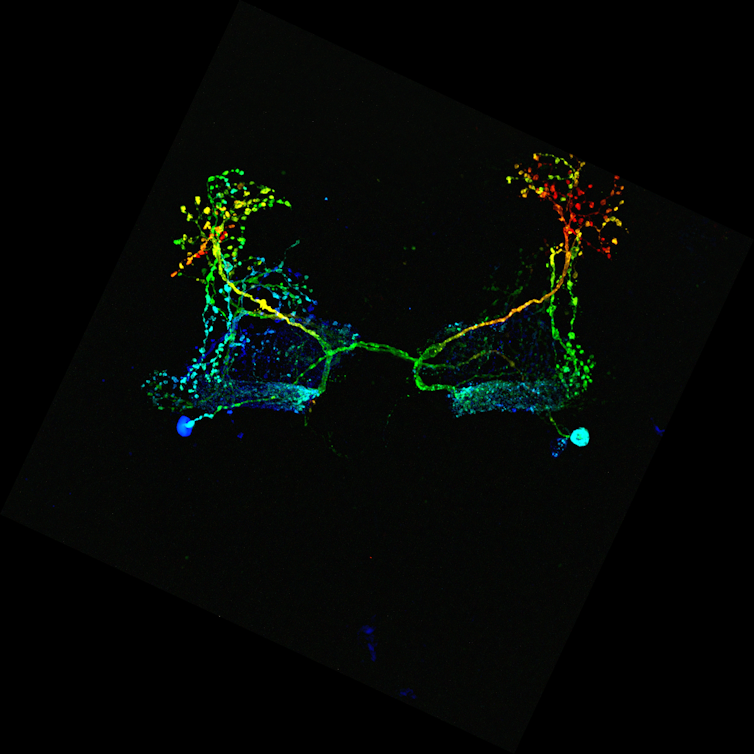
Over 350 million surgeries are performed globally each year. For most of us, it’s likely at some point in our lives we’ll have to undergo a procedure that needs general anaesthesia.
Even though it is one of the safest medical practices, we still don’t have a complete, thorough understanding of precisely how anaesthetic drugs work in the brain.
In fact, it has largely remained a mystery since general anaesthesia was introduced into medicine over 180 years ago.
Our study published in The Journal of Neuroscience today provides new clues on the intricacies of the process. General anaesthetic drugs seem to only affect specific parts of the brain responsible for keeping us alert and awake.
Brain cells striking a balance
In a study using fruit flies, we found a potential way that allows anaesthetic drugs to interact with specific types of neurons (brain cells), and it’s all to do with proteins. Your brain has around 86 billion neurons and not all of them are the same – it’s these differences that allow general anaesthesia to be effective.
To be clear, we’re not completely in the dark on how anaesthetic drugs affect us. We know why general anaesthetics are able to make us lose consciousness so quickly, thanks to a landmark discovery made in 1994.
But to better understand the fine details, we first have to look to the minute differences between the cells in our brains.
Broadly speaking, there are two main categories of neurons in the brain.
The first are what we call “excitatory” neurons, generally responsible for keeping us alert and awake. The second are “inhibitory” neurons – their job is to regulate and control the excitatory ones.
In our day-to-day lives, excitatory and inhibitory neurons are constantly working and balancing one another.
When we fall asleep, there are inhibitory neurons in the brain that “silence” the excitatory ones keeping us awake. This happens gradually over time, which is why you may feel progressively more tired through the day.
General anaesthetics speed up this process by directly silencing these excitatory neurons without any action from the inhibitory ones. This is why your anaesthetist will tell you that they’ll “put you to sleep” for the procedure: it’s essentially the same process.
A special kind of sleep
While we know why anaesthetics put us to sleep, the question then becomes: “why do we stay asleep during surgery?”. If you went to bed tonight, fell asleep and somebody tried to do surgery on you, you’d wake up with quite a shock.
To date, there is no strong consensus in the field as to why general anaesthesia causes people to remain unconscious during surgery.
Over the last couple of decades, researchers have proposed several potential explanations, but they all seem to point to one root cause. Neurons stop talking to each other when exposed to general anaesthetics.
While the idea of “cells talking to each other” may sound a little strange, it’s a fundamental concept in neuroscience. Without this communication, our brains wouldn’t be able to function at all. And it allows the brain to know what’s happening throughout the body.

What did we discover?
Our new study shows that general anaesthetics appear to stop excitatory neurons from communicating, but not inhibitory ones. This concept isn’t new, but we found some compelling evidence as to why only excitatory neurons are affected.
For neurons to communicate, proteins have to get involved. One of the jobs these proteins have is to get neurons to release molecules called neurotransmitters. These chemical messengers are what gets signals across from one neuron to another: dopamine, adrenaline and serotonin are all neurotransmitters, for example.
We found that general anaesthetics impair the ability of these proteins to release neurotransmitters, but only in excitatory neurons. To test this, we used Drosophila melanogaster fruit flies and super resolution microscopy to directly see what effects a general anaesthetic was having on these proteins at a molecular scale.
Part of what makes excitatory and inhibitory neurons different from each other is that they express different types of the same protein. This is kind of like having two cars of the same make and model, but one is green and has a sports package, while the other is just standard and red. They both do the same thing, but one’s just a little bit different.
Neurotransmitter release is a complex process involving lots of different proteins. If one piece of the puzzle isn’t exactly right, then general anaesthetics won’t be able to do their job.
As a next research step, we will need to figure out which piece of the puzzle is different, to understand why general anaesthetics only stop excitatory communication.
Ultimately, our results hint that the drugs used in general anaesthetics cause massive global inhibition in the brain. By silencing excitability in two ways, these drugs put us to sleep and keep it that way.
Adam D Hines, Research fellow, Queensland University of Technology
This article is republished from The Conversation under a Creative Commons license. Read the original article.









